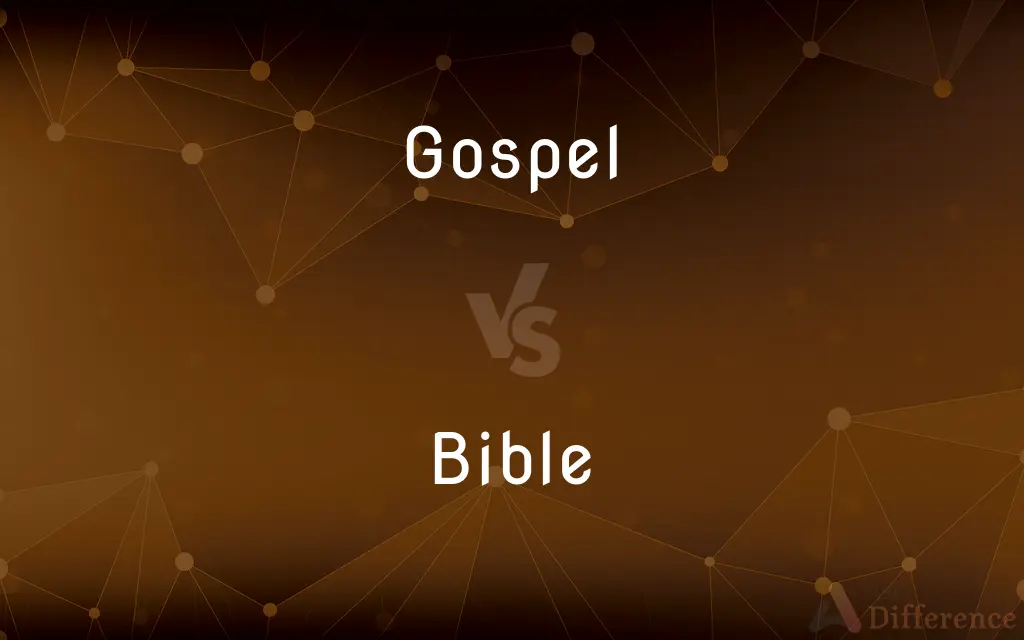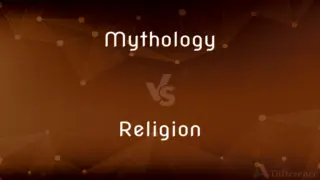Gospel vs. Bible — What's the Difference?
By Maham Liaqat & Urooj Arif — Updated on March 14, 2024
Gospel refers to the teachings and life of Jesus Christ or the first four books of the New Testament, while the Bible is the holy scripture of Christianity, encompassing both the Old and New Testaments.

Difference Between Gospel and Bible
Table of Contents
ADVERTISEMENT
Key Differences
Gospel, in Christianity, primarily denotes the "good news" of the life, death, and resurrection of Jesus Christ, focusing on salvation and the kingdom of God. It is epitomized in the first four books of the New Testament: Matthew, Mark, Luke, and John. These texts provide various perspectives on Jesus's teachings, miracles, crucifixion, and resurrection, aiming to spread faith in him as the Messiah and Son of God. On the other hand, the Bible is a comprehensive collection of religious writings sacred in Christianity, divided into the Old Testament, which is shared with Judaism and details the history, laws, and prophecies before Jesus, and the New Testament, which includes the Gospels, Acts of the Apostles, Epistles, and Revelation. The Bible serves as a foundational text for Christian beliefs, practices, and the understanding of God's relationship with humanity.
The Gospels are narratives focused specifically on Jesus's life and ministry, emphasizing his teachings, parables, and the fulfillment of Old Testament prophecies. They were written by different authors with distinct audiences and purposes, leading to variations in detail, emphasis, and perspective. Whereas the Bible encompasses a broader spectrum of texts, including historical accounts, laws, wisdom literature, prophecy, and letters, addressing a wide range of themes from creation, sin, and redemption to the nature of God, ethics, and the end times. This diversity reflects the multifaceted nature of Christian doctrine and the community's evolving understanding of faith and practice over centuries.
One key difference is the intended audience and purpose of the Gospels compared to other parts of the Bible. The Gospels were written to both preserve the memory of Jesus and to convince readers of his messianic identity and divine mission, often addressing specific communities or issues within early Christianity. On the other hand, other books of the Bible, such as the Epistles, were often written to address specific issues in early Christian communities, providing guidance, correction, and encouragement. This contextual specificity contributes to the rich tapestry of Christian scriptural interpretation and theological reflection.
The narrative style of the Gospels, which includes direct discourse, parables, and detailed accounts of events, contrasts with the varied literary forms found throughout the Bible, such as poetry in Psalms, laws in Leviticus, and apocalyptic visions in Revelation. This variety reflects the different contexts, purposes, and authorship of the biblical texts and contributes to the depth and complexity of its message. While the Gospels focus on the narrative of Jesus's life and teachings, the rest of the Bible encompasses a wider range of human experiences, divine interactions, and spiritual insights, offering a comprehensive view of Christian faith and life.
While the Gospels center on the life and teachings of Jesus Christ, presenting the core of Christian faith, the Bible as a whole provides a broader context, including the history of God's people, ethical teachings, and visions of the future. This distinction highlights the unique role of the Gospels within the Christian canon and the broader scope of the Bible in guiding believers in their faith and practice.
ADVERTISEMENT
Comparison Chart
Definition
Accounts of Jesus's life, teachings, death, and resurrection
The sacred scriptures of Christianity, including the Old and New Testaments
Contents
Matthew, Mark, Luke, John
Genesis to Revelation, including the Gospels, historical books, prophetic books, poetry, and letters
Main Focus
Life and teachings of Jesus Christ
The relationship between God and humanity, encompassing law, history, prophecy, and salvation
Target Audience
Early Christian communities and individuals seeking understanding of Jesus
Christians worldwide, for guidance, spiritual growth, and doctrinal understanding
Literary Style
Narrative with parables and teachings
Diverse, including narrative, poetry, prophecy, letters, and apocalyptic literature
Compare with Definitions
Gospel
Matthew, Mark, Luke, and John.
The Gospel of Mark focuses on the actions and miracles of Jesus.
Bible
Exploration of God's nature and human salvation.
Paul's letters in the New Testament discuss theological concepts like grace and redemption.
Gospel
Spreading the message of Jesus Christ.
Missionaries travel worldwide to preach the gospel to all nations.
Bible
The holy texts of Christianity.
The Bible is divided into the Old and New Testaments, each with its own significance.
Gospel
His moral and spiritual lessons.
The Sermon on the Mount is a key part of the gospel, outlining how to live a righteous life.
Bible
Moral, ethical, and spiritual teachings.
The Ten Commandments in the Bible provide foundational ethical guidelines.
Gospel
The message of salvation through Jesus Christ.
The preacher shared the gospel, emphasizing God's love and forgiveness.
Bible
Accounts of ancient Israel and early Christianity.
The Bible details the exodus of the Israelites from Egypt.
Gospel
Narratives of his birth, ministry, death, and resurrection.
The gospels recount Jesus's parables, such as the Good Samaritan.
Bible
The two main sections of the Bible.
The Old Testament includes the creation story, while the New Testament begins with the Gospels.
Gospel
Gospel originally meant the Christian message, but in the 2nd century it came to be used also for the books in which the message was set out; in this sense a gospel can be defined as a loose-knit, episodic narrative of the words and deeds of Jesus of Nazareth, culminating in his trial and death and concluding with various reports of his post-resurrection appearances.The four canonical gospels of Matthew, Mark, Luke and John share the same basic outline: Jesus begins his public ministry in conjunction with that of John the Baptist, calls disciples, teaches and heals and confronts the Pharisees, dies on the cross, and is raised from the dead. Each has its own distinctive understanding of Jesus and his divine role: Mark never calls him "God", Luke expands on Mark while eliminating some passages entirely, but still follows his plot more faithfully than does Matthew, and John, the most overtly theological, is the first to make Christological judgements outside the context of the narrative of Jesus's life.
Bible
The Bible (from Koine Greek τὰ βιβλία, tà biblía, "the books") is a collection of religious texts, writings, or scriptures sacred in Judaism, Samaritanism, Christianity, Islam, Rastafarianism, and many other faiths. It appears in the form of an anthology, a compilation of texts of a variety of forms that are all linked by the belief that they are collectively revelations of God.
Gospel
Often Gospel The proclamation of the redemption preached by Jesus and the Apostles, which is the central content of Christian revelation.
Bible
The sacred book of Christianity, a collection of ancient writings including the books of both the Old Testament and the New Testament.
Gospel
Gospel(Bible) One of the first four New Testament books, describing the life, death, and resurrection of Jesus and recording his teaching.
Bible
The Hebrew Scriptures, the sacred book of Judaism.
Gospel
A similar narrative.
Bible
A particular copy of a Bible
The old family Bible.
Gospel
Often Gospel A lection from any of the first four New Testament books included as part of a religious service.
Bible
A book or collection of writings constituting the sacred text of a religion.
Gospel
A teaching or doctrine of a religious teacher.
Bible
A book considered authoritative in its field
The bible of French cooking.
Gospel
(Music) Gospel music.
Bible
A document containing in-depth details about a movie or television series that writers and production staff consult in order to avoid continuity errors.
Gospel
Something, such as an idea or principle, accepted as unquestionably true
My parents' rules were gospel.
Bible
(by extension) A comprehensive manual that describes something, or a publication with a loyal readership.
Handyman’s bible
Gospel
Often Gospel Of or in accordance with the Gospel; evangelical.
Bible
(nautical) holystone: a piece of sandstone used for scouring wooden decks on ships.
Gospel
Of or relating to gospel music.
Bible
(at certain US universities) A compilation of problems and solutions from previous years of a given course, used by some students to cheat on tests or assignments.
Gospel
The first section of the Christian New Testament scripture, comprising the books of Matthew, Mark, Luke and John, concerned with the birth, ministry, passion, and resurrection of Jesus.
Bible
Omasum, the third compartment of the stomach of ruminants
Gospel
An account of those aspects of Jesus' life, generally written during the first several centuries of the Common Era.
Bible
(locksmithing) The upper part of a pin-tumbler lock, containing the driver pins and springs.
Gospel
(Protestantism) The teaching of Divine grace as distinguished from the Law or Divine commandments.
Bible
A book.
Gospel
A message expected to have positive reception or effect, one promoted as offering important (or even infallible) guiding principles.
Bible
The Book by way of eminence, - that is, the book which is made up of the writings accepted by Christians as of divine origin and authority, whether such writings be in the original language, or translated; the Scriptures of the Old and New Testaments; - sometimes in a restricted sense, the Old Testament; as, King James's Bible; Douay Bible; Luther's Bible. Also, the book which is made up of writings similarly accepted by the Jews; as, a rabbinical Bible.
Gospel
(uncountable) That which is absolutely authoritative definitive.
Took her words for gospel
Bible
A book containing the sacred writings belonging to any religion; as, the Koran is often called the Mohammedan Bible.
Gospel
(uncountable) Gospel music.
Bible
A book with an authoritative exposition of some topic, respected by many who are experts in the field.
Gospel
(transitive) To instruct in, declare, or communicate the gospel; to evangelise.
Bible
The sacred writings of the Christian religions;
He went to carry the Word to the heathen
Gospel
Glad tidings; especially, the good news concerning Christ, the Kingdom of God, and salvation.
And Jesus went about all Galilee, teaching in their synagogues, and preaching the gospel of the kingdom.
The steadfast belief of the promises of the gospel.
Thus the literal sense [of gospel] is the "narrative of God," i. e., the life of Christ.
Bible
A book regarded as authoritative in its field
Gospel
One of the four narratives of the life and death of Jesus Christ, written by Matthew, Mark, Luke, and John.
Gospel
A selection from one of the gospels, for use in a religious service; as, the gospel for the day.
Gospel
Any system of religious doctrine; sometimes, any system of political doctrine or social philosophy; as, this political gospel.
Gospel
Anything propounded or accepted as infallibly true; as, they took his words for gospel.
If any one thinks this expression hyperbolical, I shall only ask him to read Œdipus, instead of taking the traditional witticisms about Lee for gospel.
Gospel
Accordant with, or relating to, the gospel; evangelical; as, gospel righteousness.
Gospel
To instruct in the gospel.
Gospel
Four books in the New Testament that tell the story of Christ's life and teachings
Gospel
An unquestionable truth;
His word was gospel
Gospel
A genre of a capella music originating with Black slaves in the United States and featuring call and response; influential on the development of other genres of popular music (especially soul)
Gospel
The written body of teachings of a religious group that are generally accepted by that group
Gospel
A doctrine that is believed to be of great importance;
Newton's writings were gospel for those who followed
Common Curiosities
Why are there four Gospels?
There are four Gospels to provide four different perspectives on Jesus's life and teachings, each addressing different audiences and emphasizing various aspects of his ministry.
Is the Bible consistent across Christian denominations?
The core of the Bible, including the Gospels, is consistent, but some denominations may include additional books in their canons, known as deuterocanonical or apocryphal books.
What differentiates the Gospel of John from the other Gospels?
The Gospel of John emphasizes Jesus's divine nature more explicitly and contains unique events and teachings not found in the Synoptic Gospels (Matthew, Mark, Luke).
How is the Bible organized?
The Bible is organized into the Old Testament, which includes books from Genesis to Malachi, and the New Testament, from Matthew to Revelation.
Are the teachings in the Gospels repeated elsewhere in the Bible?
Some teachings of Jesus found in the Gospels are echoed in the New Testament letters, which often apply these teachings to specific community situations.
Why is the Bible important in Christianity?
The Bible is central to Christianity as it is considered God's revealed word, guiding believers in faith, morals, and the understanding of God's plan for humanity.
Can the Gospels be found outside the Bible?
While the Gospels are part of the New Testament in the Bible, they are also studied and published separately for their unique insights into Jesus's life and teachings.
What role do prophecies in the Old Testament play in the Gospels?
The Gospels often reference Old Testament prophecies to demonstrate that Jesus's life and mission fulfill these ancient predictions about the Messiah.
What is the main purpose of the Gospels?
The Gospels aim to convey the life, teachings, death, and resurrection of Jesus Christ, emphasizing his role as the Messiah and savior.
Can someone understand Christianity by only reading the Gospels?
Reading the Gospels provides a significant understanding of Jesus's life and teachings, which are central to Christianity, but other parts of the Bible also contribute to a fuller understanding of the faith.
How do translations affect the understanding of the Bible and the Gospels?
Different translations can vary in their wording and emphasis, potentially affecting interpretation, but they strive to convey the original texts' meanings faithfully.
How do the Gospels reflect the cultural and historical context of their time?
The Gospels are deeply embedded in the 1st-century Jewish and Roman context, reflecting the political, social, and religious conditions of the time and influencing their portrayal of events and teachings.
How historically accurate are the Gospels?
The historical accuracy of the Gospels is a subject of scholarly debate, but they are valued within Christianity for their theological truths and insights into Jesus's life.
How do the Gospels and the rest of the New Testament relate?
The Gospels provide the foundation of Jesus's life and teachings, while the rest of the New Testament builds on this foundation with early church history, theology, and ethical teachings.
What is the significance of the order of the Gospels in the New Testament?
The traditional order (Matthew, Mark, Luke, John) reflects early Christian tradition and theological considerations, rather than chronological order of writing.
Share Your Discovery

Previous Comparison
Chennai vs. Bangalore
Next Comparison
Mythology vs. ReligionAuthor Spotlight
Written by
Maham LiaqatCo-written by
Urooj ArifUrooj is a skilled content writer at Ask Difference, known for her exceptional ability to simplify complex topics into engaging and informative content. With a passion for research and a flair for clear, concise writing, she consistently delivers articles that resonate with our diverse audience.
















































